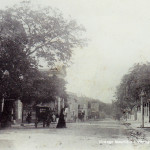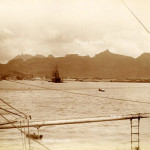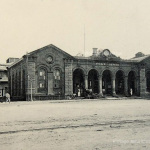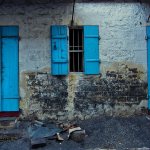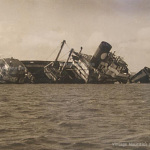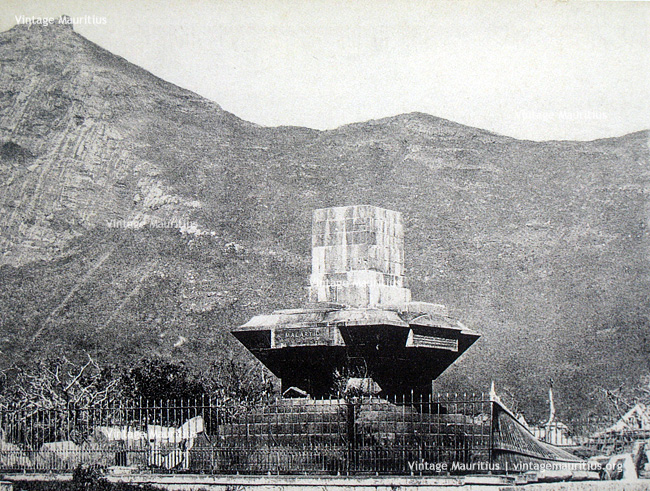
Port Louis – Tombeau Malartic – Broken in two – APR 1892
Cyclones in Mauritius are very common due to the island’s geographical location in the tropics. Summer months are very prone to such occurings and as we already know, they are both beneficial as well as unwanted. Before the 20th century, Cyclones were very unwelcomed since they nearly always had devastating effects on the island; we should imply that in those early years, both the architectural and agricultural aspect on the island was still in a developping state. Since most houses, buildings and infrastructure were mostly made of wood, the resistance towards such calamities was quite weak. Casulaties were very common then and cyclones occurred every year. This was among the reasons why the Dutch abandoned the colony before the French occupation period.
The most devastating cyclones the country faced are those of 1868, 1892 and 1945, including the famous Carol of 1960. The cyclone of 1892 caused many casualties and it is said that Port Louis was nearly destroyed. One of the occurings is the Tombstone Monument of Comte de Malartic (Governor of the island between 1792 and 1800) in Champ de Mars which was broken in two! Now imagine how strong this cyclone was to tear down a monument of stone, with the top part carried a few meters away! 660 houses were destroyed or badly damaged, around 600 people died, and a thousand wounded. Material loss was estimated at nearly 10 million rupees, and for 1892 that was a lot of money!
Concerning this monument of Comte Malartic, history tells us that as Governor he was a very appreciated man and his achievements in the colony was very successful. Unfortunately he died on the 28th of July 1800 of a cerebral congestion while going to church. The colonial government decided to raise this monument and the work was entitled to the architect Gastambide, which unfortunately didn’t completely finish the task due to the island being captured by the British afterwards. It is a certain Lady Gomm who completed the monument as such.
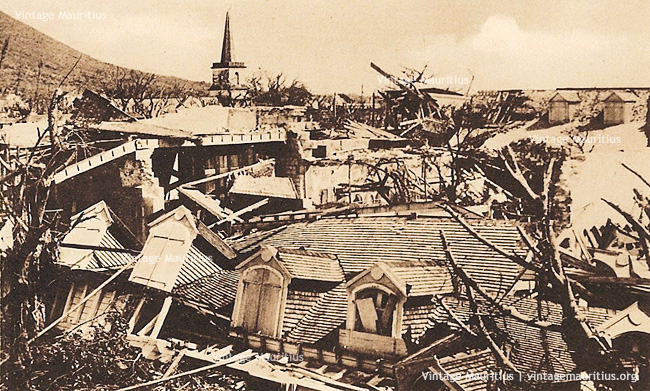
Port Louis – Cyclone 1892 – Poudriere Street – St James Cathedral
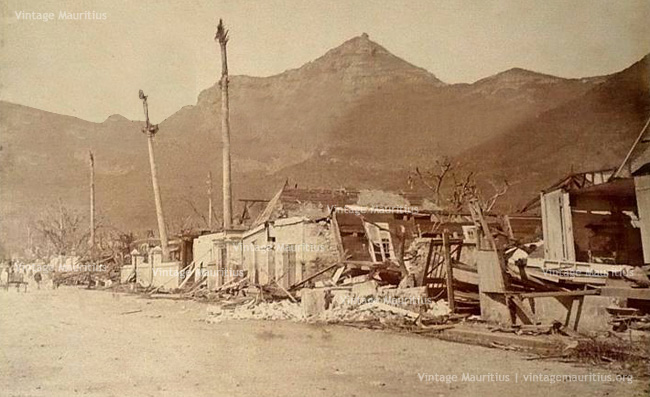
Port Louis – Cyclone 1892 – Wellington Street – Houses Destroyed
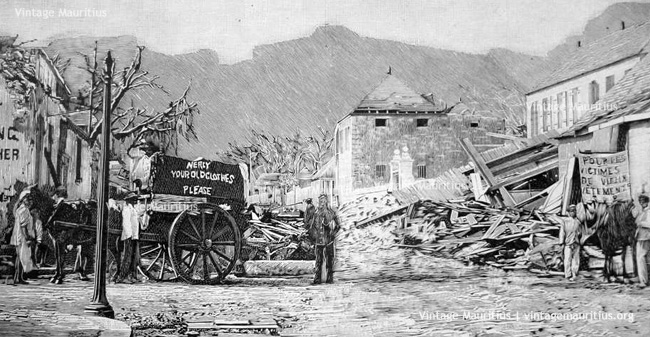
Port Louis – Illustration of Cyclone 1892 – Collect of Clothes for Victims
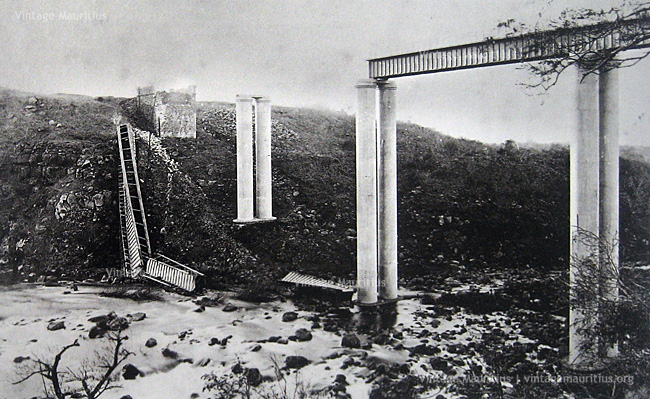
Grand River North West – GRNW – Railway Viaduct – Cyclone 1892
The extract below from the ‘Brisbane Courier’ newspaper dated 7 June 1892 gives a detailed narration of the lived situation:
THE MAURITIUS CYCLONE: THOUSANDS OF DEAD AND DYING, PORT LOUIS IN RUINS.
We glean the following particulars of the disastrous cyclone which swept over Port Louis from the local paper (the Commercial Gazette) of the latest dates, and kindly placed at our disposal by Mr. A. A. Giraud:—The colony has just been struck by one of those disasters of which there are but few examples in history.
In less than six hours it has been completely annihilated, annihilated to such a degree that it is really doubtful whether it will ever recover from the blow. Half the town of Port Louis is a heap of ruins. Thousands of the wounded, the dying, and the dead have already been dragged out from under the ruins of the houses, and as we write the living and the dead are still being dragged out. The funeral knell is continually tolling, and carts conveying the dead and wounded are to be met in all the streets. There is not a Mauritian family but is in mourning, there is not a family which is not ruined. Three quarters of the sugar houses are overthrown : the plantations are destroyed. The splendid crop we expected is reduced to zero for some estates and to less than half for those whose mills are still standing. Whole villages have disappeared ; thousands are without bread, houseless, and homeless, in the open air. Beau Bassin, Rose Hill, Phoenix, Vacoas, Rose Belle, Mahebourg-Souillac, like Port Louis, are heaps of ruins. Whole families have disappeared crushed under the ruins of their dwellings. The hurricane was not the only cause of the destruction. While the wind was blowing its hardest fires burst out in several places ; all Pouce street and the lower part of the mountain were in flames. The disaster at Martinique is spoken of as being one of the most dreadful within the memory of man. It is a question whether that which has just fallen upon us is not a still greater one.
For several days a terrible raz de marée which existed towards the north of the island showed that there was bad weather at sea, but no one thought of the possibility of a hurricane. On Friday morning the wind began to blow with some violence, but as no warning had been received from the Observatory it was thought to be only a strong breeze. At 11 a.m. the following telegram received from the Observatory was posted at the railway station and at the post office :—” At 11 a.m. barometer at sea level 29.538in., wind north-east by east at rate of fifty-eight miles per hour in the squalls, veering slowly to northward. The velocity will probably not exceed fifty-six miles an hour. Strong gale. Will telegraph every hour.” However, the wires being broken no more telegrams were received. It was only from this moment that people began to be alarmed. At 12.15 the railway manager had it announced by a bellman that the last train would leave town at 1.30 p.m. All the passengers hastened to the station, but the wind was so strong, and there was so much uncertainty about the state of the line, that they did not dare start the train. At this moment the sea overflowed the wharves and all Labourdonnais Place, the waves breaking on the Place d’Armes. A dozen barges loaded with sugar and rice sank in the harbour. The ships dragged their anchors. The Invertay broke her cables, and grounded between the Stella and the Clavis. All at once there was a complete lull ; the rain ceased, the wind fell, the sun appeared. It was hoped the weather was getting fine again. Business recommenced in town ; a great many of those who had gone to the station returned to their offices. The lull lasted about an hour and a half. Suddenly the wind began to blow again with increased violence from the opposite direction ; from north-east it had changed to south-west. A locomotive was despatched to examine the lines. The estate Rose Belle, at Grand Port, is destroyed. St. Hubert, Le Val, Riche en Eau, Beau Vallon Dauban and Rochecouste, Fernay, Union Vale are frightful ruins. It is the same thing at Savanne. Savanah, Terracine, L’Union, Bel Air, Combo, Fontenelle, have suffered enormously ; at Britannia also much damage has been done. It is the same thing with the principal estates at Flacq. Bel Etang, Sans Souci, Beauchamp, are in ruins. The news received from Pamplemousses is very bad. The new sugar house at Mont Rocher is down, as also are most of the houses in the district.
Deaths.
Prom Saturday morning till Monday at 2.30 p.m. 475 deaths had been registered at the Civil Status. At the Morgue there have been more than 800. From Friday evening till Monday afternoon there were 470 wounded persons admitted to the Civil Hospital, fifty to St. James’s Church, forty-two to the Town Hall, and there are twenty at Government House.
Never till now (the 28th April) has the island been visited by a cyclone or a hurricane at any time between the 12th of April and the 1st of December. Hitherto the hurricane season of Mauritius has been supposed to begin on the latter and to end on the former. Daylight at length came, and it was only then that the extent of the disaster became apparent. From one end of the island to the other all is death, ruin, and desolation. A great number of those detained at the central station not being able to remain any longer in uncertainty set out on foot for the country. A first batch left town at 8 o’olook, another at 11 o’clook, a third at 3 o’clock, a fourth al 5 o’clock. At 6 o’olock on Saturday morning a locomotive was sent to clear the line. It succeeded in bringing in from Coromandel that which had the day before been in collision, and had with a goods waggon escaped from Petite Rivière during the hurricane. At 8.20 a train was able to start, and arrived without obstruction at Rose Hill, but here the line was blocked by a waggon upside down. All the passengers bravely started on foot for Quatre Bornes, Phoenix Vacoas and Curepipe. Everywhere along the roads it is the same thing, roofs broken in, houses blown down, verandas carried away, dead bodies in heaps, At Trianon some sixty bodies were dug out of the ruins of the sugar house. Whole families had disappeared. At Highlands the dead are counted by hundreds. At Bassin it is the same thing. Curepipe is perhaps the place which has least suffered. There are very few houses blown down, and only one or two lives lost. The wind, however, must have blown with some violence for the veranda of the Hotel Universel was carried away, and the enormous iron columns which supported it projected in all directions. The sugar house at Midlands is blown down, all the huts have been carried away, and all those who were in them are without shelter. There was no doubt that we were in presence of a huricane without example. Solid buildings were blown down, planks, shingles, tin roofs flew about in all directions. The hurricane lasted about one hour and a half, and in that short space half the town was destroyed, the plantations were uprooted, and most of the sugar mills blown down; most of the ships in the harbour were on shore. Whilst the island was being thus devastated a great number of the inhabitants were detained in the greatest anxiety at the central station, their families being alone without assistance in the country. It was only at about 7 p.m. that people began to be aware of the extent of the disaster. A few went out in quest of news ; they came back to the station announcing that the Convent and the Orphanage de Nôtre Dame de Bon Secours had been blown down, making many victims. At the convent there was a horrible scene. Nothing was to be heard but screams and groans. With the help of lanterns an attempt was made to assist the victims, and a great number were drawn from beneath the ruins. The number of the wounded was considerable. The sky now became red; the fire had broken out amongst the ruins in several places at the same time. Some attempt was made to organize assistance, but a great part of the suburbs was on fire. As a rule when the wind is from north-east there is scarcely any danger of a hurricane in Mauritius. All our great hurricanes have commenced not with a north-easterly but with a south-easterly wind; and this is why, when the wind was from north-east by east at 11 a.m. yesterday, and the barometer at 29-338, it was considered probable that the velocity of the Wind would not exceed fifty-six miles an hour. On the 12th of February last the barometer fell to 29.325 and the greater velocity of the wind was 47.5 per hour from north-east, the barometer soon afterwards rising, and the wind decreasing. There are, apparently, only two ways of, in a measure, accounting for the passage of the centre of a hurricane over the island yesterday from west north-westward to east-south-eastward. Firstly, the cyclone which had been travelling to the northward and north-westward of the island on a south-westerly course from the 24th to the 27th re-curved to the southward and south-eastward and then bore down on Mauritius, or, secondly, a secondary small cyclone, which was generated in the south-east quadrant of the greater cyclone, travelled to the east-south-eastward. The latter is the more probable hypothesis, for yesterday’s small but violent hurricane exhibited with respect to its extent, duration, &c., the characteristics of a local atmospheric disturbance.
In its issue of the 4th May the Commercial Gazette says :-At first sight people may have thought that the next crop was entirely lost. Now that the canes have been raised up again, and our fields have resumed a normal aspect, we may say that the evil is not so great as it was believed to be. The crop will scarcely be reduced by a third, and a crop which promised to be exceptionally good, when reduced by one third, may be still considered to be a fairly good one.
INCIDENTS OF THE DISASTER.
The following will give some idea of the scenes which were witnessed by the survivors:
Mr. C. Lamothe, Superintendent of Distilleries, finding his house falling to pieces, and part of his family crushed under the ruins, endeavoured to protect his sole remaining child, a young girl. Just as he got to the door of a house a little better protected than his own he fell dead, struck by a falling beam. His unfortunate young daughter was found the next morning in Hazard street, completely naked, covered with wounds, and weeping tears of blood.
In Madame street Trebuchet’s house fell down. Mrs. Trebuchet was mortally wounded, but reached the middle of the street, where she fell and expired. A poor little child escaped from a house in the neighbourhood took refuge in her arms, and remained for more than three hours in the arms of the dead lady, which had closed upon her.
In another place groans were heard proceeding from a heap of ruins. The sufferers were quickly removed, and immediately afterwards a large bulldog jumped out. A little further off, by the side of a poor young woman whose head had been smashed, was found a little child shivering with cold. He was rescued, and as soon as he could speak he related how he owed his life to the dog, who had given him some warmth.
An unfortunate family in Citerne des Creoles street was obliged to flee from their house, which was falling down. Amongst them was a sick girl. These unfortunates went from door to door, finding nothing but ruins. They tried to shelter themselves under a wall, which fell upon them, and their clothes wore torn to pieces. It was only on Saturday at 10 a.m. that they succeeded in finding a living acquaintance who offered them an asylum.
Mr. Grand Maison was at the house of Dr. Poupinel de Valence at the moment of the catastrophe. He took up Dr. Poupinel’s child, saying to its parents, “I will take your child and will bring it back to you alive or we shall die together.” He started off. In Shakespeare street a beam split his head open, and he dropped the child. He had the courage to pick it up, to run twenty or thirty paces further, into a house which was still standing. He put the child down there, and fell senseless, and was picked up towards morning by Mr. Edouard Schmidt and his friends.
In Wellington street a poor child was kept under the ruins by a beam which was on his arm. Efforts were made to extricate him, but he only asked for water. ” Leave me here,” said he “but for pity’s sake give me some water.”
Mortality.
The total number of deaths registered up to this day (4th May) at tho Civil Status Office is 288. The number of dead people conveyed direct to the cemeteries are not included in the above, nor are the 200 unidentified bodies at the dead house.
We are in a position to state that only 224 dead bodies have passed through the dead house, out of which twenty-four were identified. The registration at the dead-house was taken during two days.
The news received from the districts announces that at Plaines Wilhelms 200 declarations of deaths have been registered at the Civil Status Office, which, however is far from being the exact number. Rose Hill is but a field of devastation. At Grand Port fifty persons have died and twenty-five at Savanne. Eleven persons were crushed to death at Rivière du Rempart during the hurricane, which has done there very great damage. There are but few houses standing at Poudre d’Or, Grand Gaube, Cap Malheureux and Grand Bay.
And from the Gallery of the Taylor family:



